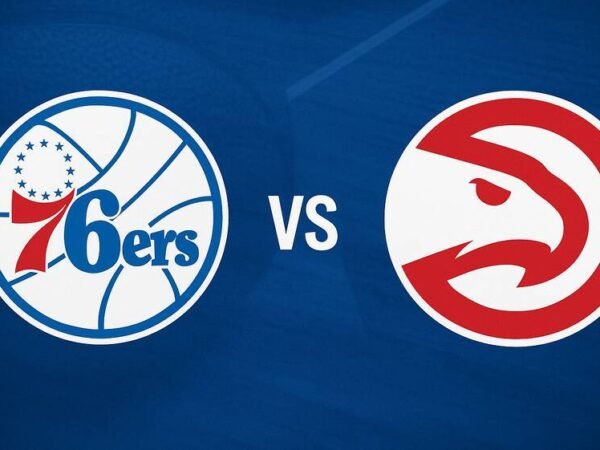In a recent NBA showdown, the Phoenix Suns faced off against the Minnesota Timberwolves, a match that ended with the Timberwolves securing a dominant 120-95 victory. This game was a vivid display of both teams’ contrasting styles and performances, with several key players stepping up to deliver memorable performances. In this detailed analysis, we will delve into the player stats that defined the game, highlighting the contributions of both Timberwolves and Suns players and examining how these performances shaped the match’s outcome.
Anthony Edwards Shines with Scoring Mastery
Anthony Edwards was undoubtedly the match’s star, leading the Timberwolves with an impressive 33 points. A combination of sharpshooting, aggressive drives to the basket, and effective use of screens and spacing marked his offensive performance. Edwards’ ability to score from different areas on the court made him a constant threat to the Suns’ defense. He shot efficiently, converting a high percentage of his field goals, which included several three-pointers and mid-range jumpers. His scoring outburst was pivotal in building and maintaining the Timberwolves’ lead throughout the game.
Karl-Anthony Towns’ Double-Double Performance
Complementing Edwards’ scoring was Karl-Anthony Towns, who contributed a well-rounded performance with 22 points and 11 rebounds. Towns’ presence in the paint significantly influenced the Timberwolves’ dominance. His ability to score inside and from the perimeter stretched the Suns’ defense and created opportunities for his teammates. On the defensive end, Towns’ rebounding prowess helped the Timberwolves control the boards, limiting the Suns’ second-chance points and ensuring more possession opportunities for his team. His double-double performance highlighted his versatility and importance to the Timberwolves’ overall strategy.
Phoenix Suns’ Offensive Efforts Led by Devin Booker
Despite the loss, the Phoenix Suns had notable individual performances, particularly from Devin Booker. Booker led the Suns with 28 points, showcasing his scoring ability and leadership on the court. His offensive efforts included a mix of driving layups, mid-range shots, and three-pointers. Booker’s performance underscored his role as the primary scorer for the Suns, and he consistently looked to create scoring opportunities for himself and his teammates. However, despite his best efforts, the Suns struggled to match the Timberwolves’ intensity and defensive pressure, ultimately limiting their scoring output.
Kevin Durant’s All-Around Contribution
Kevin Durant also significantly impacted the game, contributing 24 points and eight rebounds for the Suns. Durant’s performance highlighted his all-around game, as he scored effectively and contributed on the boards and in playmaking. His scoring came from various moves, including pull-up jumpers, post-ups, and three-pointers. Durant’s ability to create his shot and defensive presence added depth to the Suns’ game. However, like Booker, more than Durant’s efforts were needed to overcome the collective strength and performance of the Timberwolves.
Timberwolves’ Defensive Prowess
One of the critical factors in the Timberwolves’ victory was their defensive play. The team displayed a high level of defensive intensity, which disrupted the Suns’ offensive flow. The Timberwolves’ ability to switch on defense, contest shots, and force turnovers was crucial in limiting the Suns’ scoring opportunities. Players like Jaden McDaniels and Rudy Gobert played significant roles in this defensive effort, using their length and athleticism to challenge the Suns’ shooters and protect the rim. The Timberwolves’ defensive strategy effectively neutralized the Suns’ offensive threats and contributed to their overall dominance in the game.
Suns’ Struggles Against Defensive Pressure
On the other hand, the Phoenix Suns struggled to cope with the Timberwolves’ defensive pressure. While Booker and Durant could score, the rest of the team found it challenging to find open looks and convert their shots. The Suns’ ball movement was often stifled, leading to contested shots and turnovers. Additionally, the Suns’ bench players needed help to provide the necessary support to complement the efforts of Booker and Durant. This lack of secondary scoring options highlighted the Suns’ dependence on their star players and their vulnerability when facing a solid defensive team like the Timberwolves.
Bench Contributions and Role Players
The Timberwolves had a clear advantage in examining the bench contributions and role players. Players like Jaden McDaniels, who provided solid defense and timely scoring, and Naz Reid, who contributed valuable minutes and points off the bench, played crucial roles in maintaining the team’s energy and performance. The depth of the Timberwolves’ roster allowed them to sustain their level of play even when their starters were resting. In contrast, the Suns’ bench struggled to make a significant impact, with limited contributions from critical reserves. This disparity in bench production further tilted the balance, favoring the Timberwolves.
Coaching Strategies and Adjustments
Coaching strategies and in-game adjustments also significantly influenced the match’s outcome. Timberwolves coach Chris Finch implemented a game plan that effectively utilized the strengths of his key players while exploiting the Suns’ weaknesses. The emphasis on strong defensive play and quick transitions on offense kept the Suns on their heels. Finch’s ability to make timely adjustments, such as changing defensive schemes and rotating players to maintain fresh legs, was instrumental in the Timberwolves’ success.
On the other hand, Suns coach Monty Williams faced challenges in adjusting to the Timberwolves’ game plan. While Williams tried to create opportunities for Booker and Durant, the lack of effective ball movement and the inability to penetrate the Timberwolves’ defense proved to be significant obstacles. Williams’ attempts to mix up defensive assignments and rotations were met with limited success as the Timberwolves continued to find ways to score and maintain their lead.
Statistical Breakdown and Game Flow
A detailed statistical breakdown of the game further illustrates the dynamics at play. The Timberwolves shot at a higher field goal percentage than the Suns, reflecting their efficient scoring. Additionally, the Timberwolves had more assists, indicating better ball movement and teamwork. Rebounding statistics also favored the Timberwolves, highlighting their control of the boards and limiting the Suns’ second-chance opportunities. Turnover statistics showed that the Suns committed more turnovers, which the Timberwolves capitalized on with fast-break points and transition plays.
The game’s flow was characterized by the Timberwolves’ ability to build and maintain an early lead through consistent scoring and defensive stops. Despite periods of practical play, the Suns needed help to string together enough successful possessions to mount a serious comeback. The Timberwolves’ balanced attack, with multiple players contributing significantly, contrasted with the Suns’ reliance on their star players.
Looking Ahead: Implications for Both Teams
This match had several implications for both teams moving forward. The victory was a testament to the Timberwolves’ potential when critical players like Edwards and Towns performed at a high level. It also underscored the importance of their defensive strategy and the contributions of their role players. This game could be a confidence booster and a blueprint for future success against strong opponents.
The loss highlighted areas that need improvement for the Suns, particularly in handling defensive pressure and finding consistent scoring from players beyond Booker and Durant. The game exposed the Suns’ vulnerability when their star players are contained and the need for a more balanced offensive approach. Coach Monty Williams and his staff will likely focus on these aspects in practice and future games to enhance the team’s resilience and adaptability.
Conclusion
The Phoenix Suns vs. Timberwolves match was a game of contrasts, with the Timberwolves showcasing their strength in both offense and defense. At the same time, the Suns displayed the brilliance of their star players but struggled with overall team performance. The player stats from this match provide a clear picture of the factors that contributed to the outcome. Anthony Edwards’ scoring explosion, Karl-Anthony Towns’ double-double, and the Timberwolves’ defensive intensity were critical elements of their victory. Meanwhile, the efforts of Devin Booker and Kevin Durant, though commendable, were not enough to secure a win for the Suns. This game serves as a valuable case study in understanding the impact of individual and team performances in determining the result of a high-stakes NBA match.
Do Read: Orlando Magic vs Cleveland Cavaliers Match Player Stats












